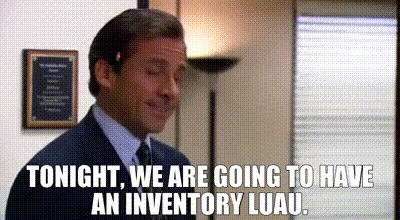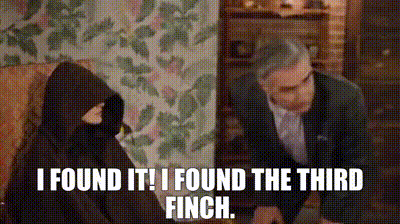What do we owe to each other at work?
Besides clean communal microwaves that we do *not* cook fish in 💀
Bye summer, hello fall. It’s September, it’s back to school season, and that means: everyone that has been off on holiday in the last few weeks (months) is coming back to work.
Whether you work remotely or in an office, get ready for an influx of “I’ve just taken my vacation so I’m coming back with one thousand ideas” energy. (That’s why it's important to take your OWN time off - and it isn’t too late. Read more in our vacation newsletter here.)

Depending on how well-rested you are, the enthusiasm of this human can be invigorating or irritating.
And even if you don’t use the word, you may be thinking of what they “owe” you. Any of these feel familiar?
“This human needs to give me some space - I’ve been here covering their work.”
“This human should bring their ideas to someone else - I am too busy.”
“This human ought to be coming up with these ideas all the time - that’s what we need.”
“This human must think about the rest of the work to be done if they’re going to bring these ideas.”
And if you’re the person coming back from holiday?
“This human needs to be more receptive to this idea.”
“This human must help me do this XYZ thing, because I can’t do it alone.”
“This human seems not as grateful as they should be for this idea.”
“This human ought to hear me out before shooting down my idea with other tasks.”
If you’re thinking, “What a minefield,” you are correct. When we work with other people, there’s plenty of room for communication….let’s call it puzzles. Communication puzzles.
As always, to solve these puzzles, the first place to start is with what we can control.
So, what do we owe to each other at work? In a word: Respect.
Respect is a weighty word that raises big emotions - so let’s look at it through a lens of another situation, that is similar to work, that also requires respect.
Let’s go to an escape room.

Escaping, say, a scientist's locked office is not that different from work.
You’re all on the same team, but depending on your skill sets, you might have different responsibilities (one person focuses on the pun-based riddles hidden in the wallpaper, while someone else tries all the combination locks).
You may also be on the same team within that team. (Because to lift the hidden panel in the bookcase, someone has to be across the room pulling the curtain rod that’s actually a secret lever, while your fellow detective peers inside the panel for the clue).
Regardless of your role, for the escape room to be fun (and to escape!), everyone understands a few basics:
We’re here to follow the rules. Meaning we know what the rules are, and we can trust that our teammates also know them and will follow them for maximum fun.
When you go into an escape room, you trust that all of your friends know what’s about to happen. You trust that they’ll look for clues. You trust that they have listened to the host’s instructions, so they know that the “ask the host” button is really for emergencies only and that no, the door isn’t locked, they can leave at any time. No need to break it down - you are not actually in an evil laboratory. This is what helps everyone enjoy the escape room.
We’re here to work together, and we have to work together to get out.
Escape rooms love puns, tricksy math, and squeezing through small spaces. Not everyone is great at all of these things, which is fine. That’s why you have to have people with you in the escape room. But if someone comes with you and doesn’t ask for help? Not good - time is ticking! Ask the Riddles Friend™ for help. Or if you’re really feeling frustrated, leave them be. We can use your help over here with the tricksy math! Time is ticking!
Related to that: We’re here to accomplish a goal (and we want to spend the optimal amount of time to do it).
The goal is to get out of the escape room. And yes, it’s nice to do it quickly, but we also recognise that if you can get out of the escape room in 15 minutes, that probably isn’t worth doing. At the same time, no one wants to be stuck in an escape room for 8 hours.I don’t care how close of friends you are, someone will end up crying.
We’re here because we don’t mind being locked inside a room with these humans and think these are the humans that we’d like to solve puzzles with.
Escape rooms aren’t something we want to do 24/7, but for this period of time, we have indeed signed up to do it with them. Which means none of us should be grouchy about being stuck in a room with them - unless, for example, they’re not following the above rules! Also, no room for insults or trash-talking either - if you’re doing that, why did you even come?
Puzzles aside, this is a good summary of we owe to our colleagues at work.
To create a nice workplace and to be a nice person to work with, our team members should trust that:
I know the rules and can be trusted to follow them.
I am here to work with other people, and I know that their skill sets differ from mine.
I am here to accomplish the big team goal, and they can trust that I am incentivized to do that in the optimal amount of time.
I like the people I work with enough to work with them for 40 hours a week.
To apply to a non-escape-room-but-rather-work scenario: If this is what we owe to our colleagues, what does this look like if they’ve come back from holiday with all the energy?
We owe them the basics of rational behavior - namely, to follow the rules. If they’re interrupting us during important meetings or work, we are expected to tell them. We also owe them professional respect and patience with their enthusiasm - it is not their fault we are not also arriving back from a holiday.
We owe them our teamwork. If they have a good idea, and if it requires our help or signoff, we need to be prepared to offer it…
…on the right timeline. We owe them an honest accounting of our bandwidth and we owe them an explanation, if they ask for one, about where we see this project aligning with the grander goal (ie: to help everyone get out of the escape room).
We owe them, and ourselves, interactions and actions that make up a nice workplace. Which means not trash-talking their idea to someone else, and being willing to work with them if the project goes ahead. It means being respectful of their positive energy and not finding ways to scrub it out as soon as possible. It means letting people exist, and setting a boundary if their existence is a bit too sunny for us at the moment.
That’s it. That’s what we owe to each other. No more, no less.
(PS. Paid subscribers, take a peek at the end of the newsletter! We’ve added a bonus section for what we owe our colleagues if we’re the person with post-vacation enthusiasm. 😬🏖️)
What we owe to our colleagues is within our control. But there’s only so much zen-master-calm we can cultivate in the face of work events like - the Microwave Mess.
Another Office reference (sorry, British Office-watchers) but my question essentially is, what do you do when there’s a work situation where there’s such a big gap in what we think we owe one another?
Next week, we’re tackling exactly this - what do our colleagues owe us?
It should be identical to what we owe them, but we’re going to look at it from a different perspective. Namely, from the point of view of that Difficult Colleague™ who, for some reason, has left the microwave a mess. Or, even worse, cooked fish in it. 👀
Crush it this week.
xRachel
Links We Love 📚
If you have not watched the Good Place, you must - it is where we got the inspiration for today’s newsletter title. If you aren’t down for a whole (hilarious) show, read Dan Schur’s book on the philosophies that inspired the show - and come to terms with the fact you’ll get spoiled on a truly amazing twist! For that reason, I can’t link to an article about the show without spoilers, so just trust me (and the Rotten Tomatoes score).
✨ Bonus for paid subscribers: What if I’m the person with post-vacation enthusiasm?
Keep reading with a 7-day free trial
Subscribe to Nice Work to keep reading this post and get 7 days of free access to the full post archives.





